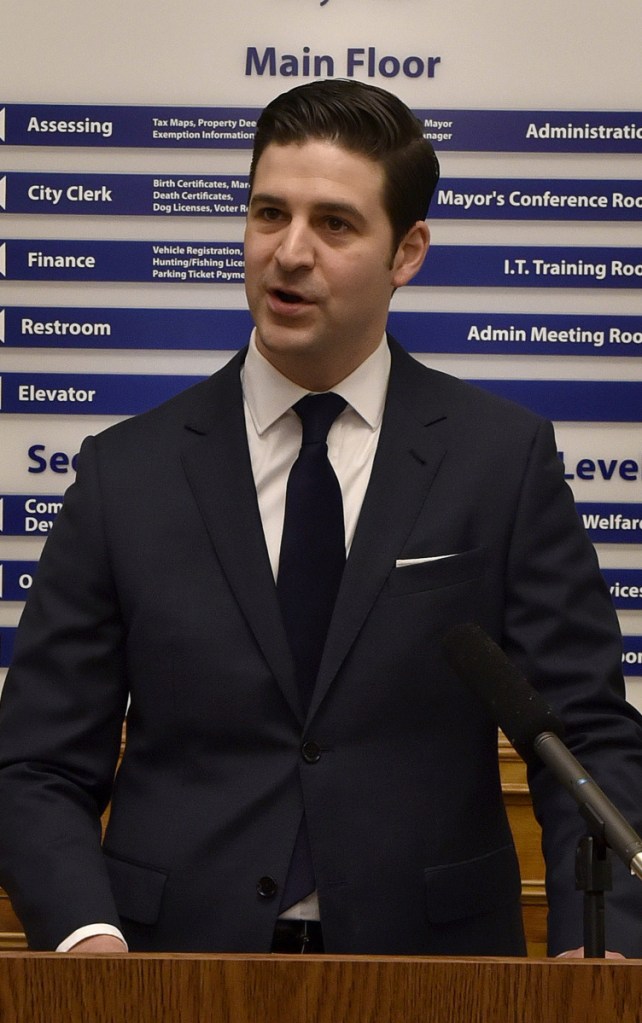Nick Isgro also calls for ending party affiliations in local elections, forcing paid lobbyists to register.
WATERVILLE — Mayor Nick Isgro wants to end partisan elections for local offices, put a 3 percent cap on the amount the property tax rate can be increased per year, and require people paid to lobby city officials to register with the city clerk.
Calling his initiative Waterville Works, Isgro, a Republican, wrote in a recent news release that based on feedback from residents, he will support those charter changes when the charter is reviewed next year.
Some Democrats and City Manager Michael Roy disagree with some of Isgro’s ideas. Roy said he “very much” disagrees with the mayor’s proposal to place a permanent 3 percent tax cap on future city expenses.
Roy said he wanted to emphasize that his views are his own and do not represent those of city councilors, for whom he works.
“If adopted, voters today would be restricting voter options in the future for needed or agreed-upon expenses,” Roy said of the tax cap proposal. “Are we saying that we don’t trust voters in the future to make good decisions? This idea doesn’t sound very democratic to me.”
The City Council in June voted 6-0 to approve a proposed $41.9 million municipal and school budget for 2018-19 that increased the tax rate by $1.94 per $1,000 worth of property valuation – an 8.3 percent tax increase. Isgro vetoed the action, but the council later overrode his veto.
The current tax rate is $25.27 per $1,000 worth of property valuation.
In arguing for a tax cap, Isgro says there should be a better way to “keep Waterville affordable for working middle-class families and seniors living on fixed incomes, while making sure critical needs are met.” It would protect residents, Isgro writes, and ward against “wild proposals” of a 13 percent tax increase – a reference to the initial city budget Roy proposed earlier this year before the City Council began its review and voted on spending cuts.
Such budget proposals “are done to scare everyone so later they can tell us we should be happy with ‘only’ an 8 percent increase,” Isgro writes. “We can find common ground within reasonable guidelines that this kind of charter change would put in place.”
Roy concurs with the mayor that a charter review provides an important opportunity to look at how the city is governed.
“I also agree with him that electing city officials based on Democrat or Republican party affiliation can be a real detriment to effective governance,” Roy said. “I would add one additional concern about our present system of electing city councilors and school board members. In my opinion, the ward system of deciding who’s elected is an antiquated, undemocratic method of choosing our city leaders. This system serves to discourage many interested and qualified people from running for office. It can also serve to pit one section of the city against another, and this is never healthy. People should run to represent the entire city and not one specific neighborhood.”
Claude Francke, who until recently was chairman of the Waterville Democratic City Committee, called at least two of Isgro’s ideas “red herrings.”
“Instead of worrying about party affiliation, how about citywide election of councilors using a proportional representation system?” Francke said. “Lobbyist registration is a red herring. The size of the Waterville budget is laughable in terms of lobbyist interest. Is the mayor being supported by the National Heritage Foundation?”
Francke also describes the cap on the property tax rate as “a red herring” and thinks it is “an attempt to shift the debate away from the progressive income tax, which shifts the tax burden from static property taxes to the economic engine of our society, rising incomes.”
The new Democratic City Committee chairman, Lily Herrmann, said she is focusing on the Nov. 6 election, in which voters will have an opportunity to elect four new Democrats to the City Council. Republicans have nominated three people to run for the council seats, and there are also three people running unenrolled.
Herrmann, a Colby College student, didn’t address the partisan election proposal directly when asked for comment via email, but said: “When looking at their ballots, voters will know that Democrats support core values such as economic opportunity and equal access to adequately funded education. I look forward to engaging in conversation with Waterville voters in order to learn about what issues are important to them.”
Isgro said party affiliation should be removed from ballots and people should vote for the person they think would do the best job.
“Political parties are subject to influence by lobbyists and outside special interests, and they try to divide us by making us look at each other as adversaries instead of neighbors. It’s time to take away one of the ways we can be divided as a people and make it easier for folks who care deeply for our community to run for office.”
He also said anyone paid to lobby a mayor, city staff or councilor on behalf of another entity should register and pay an annual fee to the city clerk.
“The registration process should include paying an annual fee, disclosing all communications with city officials, and filing a monthly report on all lobbying activity and compensation received,” Isgro’s news release said. “Lobbyists have to register with the state to lobby legislators in Augusta, so why not do this locally so we can have as much transparency as possible about who is trying to influence Our City?”
Amy Calder can be contacted at 861-9247 or at:
acalder@centralmaine.com
Twitter: AmyCalder17
Copy the Story LinkSend questions/comments to the editors.





Success. Please wait for the page to reload. If the page does not reload within 5 seconds, please refresh the page.
Enter your email and password to access comments.
Hi, to comment on stories you must . This profile is in addition to your subscription and website login.
Already have a commenting profile? .
Invalid username/password.
Please check your email to confirm and complete your registration.
Only subscribers are eligible to post comments. Please subscribe or login first for digital access. Here’s why.
Use the form below to reset your password. When you've submitted your account email, we will send an email with a reset code.